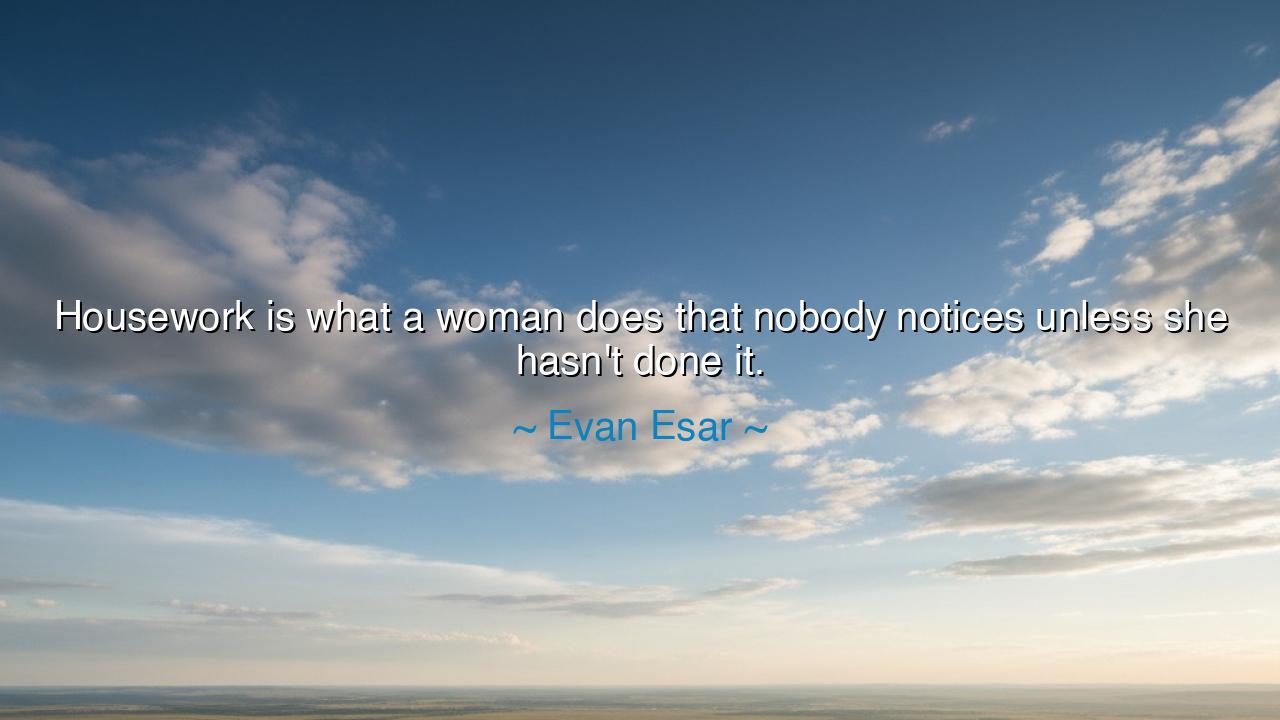
Housework is what a woman does that nobody notices unless she






“Housework is what a woman does that nobody notices unless she hasn’t done it.” — so spoke Evan Esar, a man whose wit hid within it the quiet sorrow of unseen labor. His words, though wrapped in humor, unveil a truth as old as hearth and home — that the invisible work of care sustains the world, yet the world seldom bows to it. The floors gleam, the clothes smell of wind and sun, the meals appear as if by magic — and none remember the hands that made it so, until dust gathers, or hunger knocks, or disorder reigns. Then, in absence, her presence is known.
In the days of our ancestors, before the clamor of the cities and the rush of the world, the home was a sacred circle. The woman was its guardian flame. She tended to the unseen, and through her quiet craft, she preserved life itself. When Esar spoke of housework, he spoke not merely of brooms and dishes, but of the unthanked rituals that keep the chaos of the world at bay. The bed made each dawn is not a task — it is a renewal of peace. The meal prepared in silence is not drudgery — it is devotion. Such work is the heartbeat of civilization, though it beats unheard.
Consider the story of Penelope, wife of Odysseus, who for twenty years wove and unwove her loom, holding her home together while her husband wandered the seas. To the men of her house, her weaving seemed idle work; to her, it was both shield and sword — a quiet act of endurance that kept faith alive. So too are the acts of countless women through the ages: the mothers, the wives, the daughters who mend, clean, nurture, and heal, unpraised yet indispensable. Their toil is the fabric from which the world is spun.
There is a tragedy in invisibility, yet there is also nobility. For that which is unseen may still be divine. The rain does not boast when it nourishes the earth, nor does the sun seek thanks for its warmth. The same spirit dwells in those who labor in silence. But Esar’s words also awaken a deeper call — that recognition is a form of justice. The unseen deserve to be seen, not for vanity’s sake, but to remind humanity that love and labor are one.
When the house is tidy and calm, it is easy to forget the hands that shaped it. But when the rhythm breaks — when the sink fills, when the garments pile, when the hearth grows cold — then we see the truth of the quote. The absence of care reveals its presence. In this, Esar shows us a mirror of gratitude: that we must learn to notice not only what is missing, but what has always quietly been there.
So, let us honor the invisible. Let every sweeping, washing, and folding be seen as a song of devotion. Let the men and children of every house learn the sacredness of labor shared. To those who do such work — lift your head. Your hands sustain the world, though the world forgets. You are the unseen architects of comfort, the keepers of order, the silent artists of love.
And to those who benefit from such unseen care — do not wait for its absence to feel its worth. Speak gratitude aloud. Share the work. Teach your heart to see. For in every home, the smallest act of acknowledgment becomes a flame that brightens both giver and receiver. Thus shall the words of Esar cease to be a lament, and become instead a lesson fulfilled — that the unnoticed work, once honored, becomes holy.
Lesson: Notice the unseen. Speak your gratitude daily. Take part in the labor that sustains your life. For in recognizing the invisible, you awaken the divine within the ordinary — and in doing so, you give every humble act the dignity of eternity.






AAdministratorAdministrator
Welcome, honored guests. Please leave a comment, we will respond soon